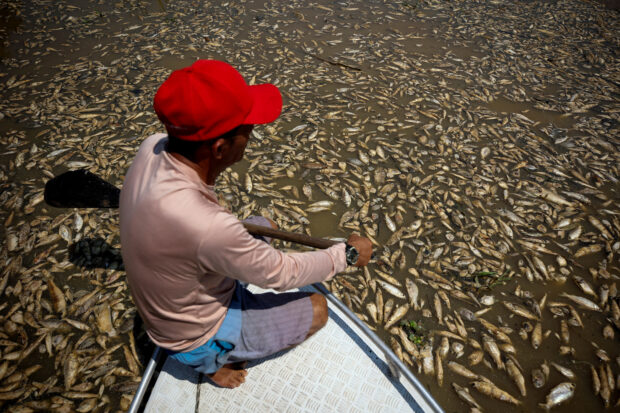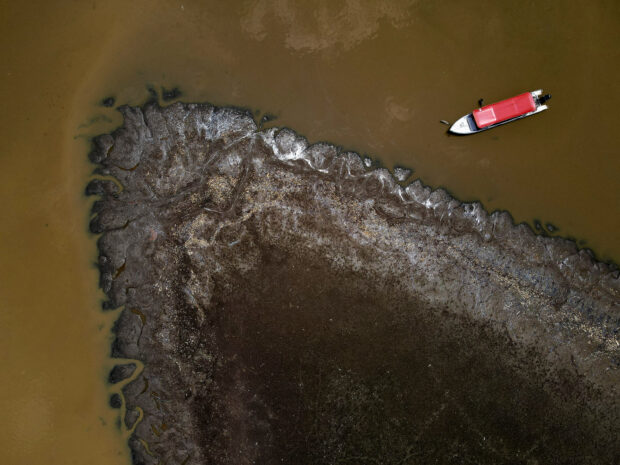In Brazil’s Amazon, drought affects locals’ access to food and water

Boat pilot Paulo Monteiro da Cruz observes dead fish at Piranha Lake, which has been affected by the drought of the Solimoes River, in Manacapuru, state of Amazonas, Brazil, September 27, 2023. REUTERS/Bruno Kelly
MANACAPURU, Brazil — Some rivers winding through Brazil’s vast Amazon rainforest have piled up with dead fish in recent days as a worsening drought has led water levels to fall, affecting local communities’ access to food and drinking supplies.
Over 110,000 people have already been affected, officials say, as the dead fish have rotted and contaminated the water supply.
In Manacapuru, a town two hours’ drive from the jungle city of Manaus, fish were jumping in an attempt to escape the scorching, shallow waters and the smell of the rotting animals in the brown water was suffocating.
“It is difficult because of the contamination of the water, we need a lot of it to bathe. And we also drink the water, but because it is contaminated we’re not drinking it,” said 19-year-old shopkeeper Caroline Silva dos Santos in Manacapuru.
“We’re getting water by bringing it from the city.”
Videos of other deceased animals, including fresh water dolphins, have been circulating on social media.
The region is under pressure from the El Niño weather phenomenon, with the volume of rainfall in the northern Amazon below the historical average. In Amazonas state, 59 out of 62 municipalities are facing drought and 15 of them are in a emergency situation, according to the Amazon Working Group, which brings together 503 local organizations.
The water level of the Rio Negro – the largest left tributary of the Amazon River – has been dropping by 20cm (8 inches) a day, the organization said.

Dead fish are seen at Piranha Lake in Manacapuru, state of Amazonas, Brazil, September 27, 2023. REUTERS/Bruno Kelly
In 2010, a severe drought pushed river levels in the Amazon region to record lows, creating similar problems.
“We are not quite at that level (2010) yet, but we have the potential to get to that point. I think it is already a reflection as to what may be the new normal that we are going to be facing in the future,” said Ane Alencar, science director at the Institute for Amazonian Environmental Research (IPAM).
Alencar said climate change will affect not only nature, but people’s lives in the Amazon.
“People will lose their goods, homes, cattle. We usually neglect the impacts of drought on human life and health,” she said, adding that the government needs to be more prepared for these kinds of events.
Locals who are running out of supplies and are unable to fish in the waters are calling for extra support. Brazil’s government said on Wednesday it was preparing a task force to provide emergency assistance to inhabitants.
“The drier it gets, the more fish die and the more precarious the situation becomes,” said Anesio Junior, a 39-year-old fisherman in the region.
“We’re here asking for support from everyone in the municipal and state government who can help us in this emergency situation.”